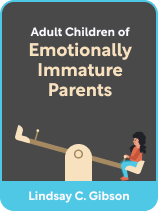

This article is an excerpt from the Shortform book guide to "Adult Children of Emotionally Immature Parents" by Lindsay C. Gibson. Shortform has the world's best summaries and analyses of books you should be reading.
Like this article? Sign up for a free trial here.
What are the four types of emotionally immature parents? What impacts do these parents have on children?
According to Lindsey Gibson in her book Adult Children of Emotionally Immature Parents, there are four types of neglectful parents to look out for. These parents are either emotionally chaotic, relentlessly goal-focused, hands-off, or aggressively disinterested.
Read below to learn about the four types of emotionally immature parents.
The Four Types of Emotionally Immature Parents
The features of emotionally underdeveloped parents manifest in different ways to produce four types of emotionally immature parents. Each type resides on a spectrum of severity from moderate to profound. Additionally, some parents contain traits from multiple types.
Type 1: Emotionally chaotic
This parent is unable to regulate their emotions and relies on their child and others to ground them emotionally. Their unpredictability leaves everyone around them on edge and fearing that they’ll be the next target of the parent’s unhappiness. Their emotions govern the household.
Impact: Children of an emotionally chaotic parent learn to work around their parent’s emotions. As adults, they may be overly attuned to others’ needs to the exclusion of their own.
Type 2: Relentlessly Goal Focused
This parent relentlessly pushes their child to achieve goals they believe are important and judges their progress without regard for the child’s feelings or needs. Because they often grew up in an emotionally deprived household and consider themselves self-made, they’re certain they know what’s best for their child.
Impact: Children of a relentlessly goal focused parent learn that nothing is good enough unless they’ve done exactly what the parent wants. As adults, they may feel unmotivated, depressed, and as if they should be doing more.
Type 3: Hands Off
This parent disengages from decision-making that impacts their child and passively allows situations to unfold. They often partner with a dominant person and are seen as the “easier,” “fun” parent. They often look away when their partner rages or is abusive toward their children because they don’t see their role as “protector” and want to avoid the abuse themselves.
Impact: Children of hands off parents are left to protect themselves. They may believe their parent is a helpless victim rather than an adult responsible for protecting them. As adults, they may make excuses for others who don’t look out for their needs.
Type 4: Aggressively Disinterested
This parent wants nothing to do with their children and rejects their child’s efforts to engage with them emotionally. They’re typically irritable, surly, cold, mocking, and can be overtly abusive.Impact: Children of aggressively disinterested parents may grow up believing they’re a nuisance because their parent conveyed this message in verbal and non-verbal ways. As adults, they may have difficulty asking for things because they believe they’re bothering people.
Another Model of the Emotionally Immature Parent
Gibson concludes that the behavior of all four types of emotionally underdeveloped parents is the result of emotional neglect or trauma that they suffered as children, which is not an excuse but an explanation for why they behave the way they do—and that this information is a tool their children can use to determine how to interact with them in healthier ways.
In contrast, Dr. Jonice Webb defines three types of emotionally neglectful parents, and offers a more forgiving view of two of them: Well-Meaning-But-Neglected-Themselves (WMBNT) parents and Struggling Parents love and do their best to raise their children but fail to parent in emotionally healthy ways. Self-Involved parents don’t act in their children’s best interests and damage their children.
Type 1: WMBNT Parents
WMBNT parents don’t know how to engage with their children in healthy ways because their parents emotionally neglected them. They fail to set effective limits; equate their ability to provide material goods with love; and emphasize achievements over feelings.
Children of WMBNT parents may:
- Feel that their parents don’t really know them
- Rationally understand that their parents love them but not feel that love
- Feel guilty or confused about why they’re angry at their parents
Type 2: Struggling Parents
Struggling parents are too overwhelmed by their problems and responsibilities to meet their children’s emotional needs. Their struggles may include bereavement, divorce, mental or physical illness, or other demands and hardships.
Children of struggling parents may:
- Want to help or take care of their parents
- Feel grateful for—and also angry at—their parents
- Focus excessively on other people’s needs while ignoring their own
Type 3: Self-Involved Parents
Self-involved parents are motivated by power, control, and what’s best for them. They are narcissists, authoritarians, addicts, and sociopaths whose behavior does long-term emotional damage to their children.
Children of self-involved parents may feel:
- Anxious before seeing their parents and manipulated during interactions with them
- Angry at their parents
- Like their parents’ relationship with them is fake or false

———End of Preview———
Like what you just read? Read the rest of the world's best book summary and analysis of Lindsay C. Gibson's "Adult Children of Emotionally Immature Parents" at Shortform.
Here's what you'll find in our full Adult Children of Emotionally Immature Parents summary:
- A look at the damage that emotionally neglectful parents can do to their children
- Strategies to help adults turn their relationship with their parent from toxic to tolerable
- Ways to heal and move forward from childhood emotional neglect






